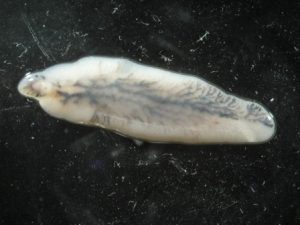
Fasciola hepatica, commonly known as the liver fluke, is a parasitic flatworm that causes fascioliasis, a disease affecting the liver and bile ducts in both humans and animals, especially livestock. The parasite is found worldwide, particularly in regions where sheep and cattle are raised and where freshwater plants, such as watercress, are consumed.
Humans become infected by ingesting contaminated water or freshwater plants that harbor the larval stage of the fluke. After ingestion, the larvae migrate from the intestines to the liver, where they mature and invade the bile ducts, causing inflammation.
Fascioliasis has two stages: the acute stage and the chronic stage. In the acute stage, symptoms may include fever, abdominal pain, nausea, and an enlarged liver due to the fluke’s migration through liver tissues. In the chronic stage, which occurs after the flukes reach the bile ducts, symptoms can include bile duct inflammation, jaundice, and in severe cases, bile duct obstruction or fibrosis.
Treatment for fascioliasis often involves triclabendazole, which is highly effective against both the juvenile and adult stages of the parasite. Preventive measures include avoiding the consumption of raw freshwater plants and improving water sanitation in affected regions.



